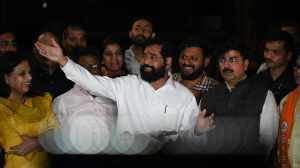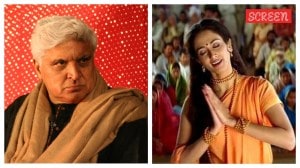The last supper
In the latest episode of the Samajwadi Party-Communist Party of India Marxist decade-long soap opera, the main protagonists8212;SP8217;s...

In the latest episode of the Samajwadi Party-Communist Party of India Marxist decade-long soap opera, the main protagonists8212;SP8217;s Mulayam Singh Yadav and CPIM8217;s Harkishen Singh Surjeet have finally put an end to the 8216;8216;dinner party affair.8217;8217; After two weeks of gossip, slander and pitched speculation on whether Yadav8217;s emissary, party spokesperson Amar Singh was 8216;invited8217; to Congress President8217;s Sonia Gandhi8217;s dinner party or whether he had 8216;8216;gatecrashed8217;8217; as was widely believed, the matter has been settled.
Surjeet declared three days ago he had indeed invited Singh and SP ally, Ajit Singh of the RLD, to Gandhi8217;s dinner despite the absence of an invitation, as he 8216;8216;wanted the country to see all those who contributed to the defeat of the communal forces on a single platform.8217;8217; The clarification came after Yadav charged Surjeet of 8216;8216;humiliating8217;8217; Singh by dragging him along.
However, on the other hand, Singh has declared he will never step into Sonia Gandhi8217;s house again. 8216;8216;Sonia Gandhi8217;s silence on this episode has made me promise myself I will never enter 10 Janpath, ever in my life,8217;8217; said a peeved Singh.
It is perhaps for the first time that dinner party intrigue has defined the faultlines of the politically-charged state of Uttar Pradesh. However, what has remained consistent is the on-off friendship between Yadav and Surjeet, two unlikely partners who have lurched together through the tumultuous decade of Mandal, temple and market-dominated politics. Their friendship is based on a mutually beneficial arrangement for both parties 8212; for Surjeet, it is necessary to keep Mulayam in good humour despite bursts of frustration, to build a non-Congress, non-BJP alternative front 8212; though in the present context it would be to keep the 8216;8216;communal forces8217;8217; read BJP out of power.
For Yadav, to have Surjeet backing him ensures the full support of the Left parties, an influential block of MPs, and is an investment which could prove very fruitful at any time in the future 8212; when he pitches himself as candidate for the prime minister8217;s post.
Surjeet and Mulayam met in the late 80s, when the CPIM, who was always in the search of allies, picked Yadav, then a rising star of UP politics. It was the heady days of Mandal politics which saw the emergence and convergence of regional forces for a non-Congress alternative remember it was the Congress which was Enemy No 1, and therefore, included the BJP too. The Janata Dal was born in 1987, and came to power two years later, with Yadav in government, and the Left supporting it from outside.
Despite Surjeet8217;s obvious indulgence of Yadav, the latter has always shot off on his own. The first cracks appeared when Mulayam deposed his known rival, Prime Minister VP Singh, and helped install Chandra Shekhar in the chair. Says a CPIM member today, 8216;8216;Despite those years of co-operation and friendship, Mulayam broke off to be on Chandrashekhar8217;s side. But then the BJP kicked off its Ayodhya campaign, the Babri Masjid fell, elections were called, we campaigned jointly with Mulayam, he came to power, and we were back together again for chances of the success of a third alternative looked possible again.8217;8217;
It could not have been more true, the Congress was defeated in 1996, and the National Front and its successor, United Front, came together to rule for two years. While Surjeet held the master key to government formation and its smooth running, Mulayam was a key player too. He was Union Defence Minister and almost became prime minister when Deve Gowda was voted out of power. It was Surjeet who revealed to The Indian Express early this year, 8216;8216;All the Front allies had accepted Mulayam as PM instead of IK Gujral, but it was vetoed by Laloo Yadav.8217;8217;
It was Mulayam8217;s first real taste of national politics but he was also quick to realise the need for a national image. He set out to shed his rustic, 8216;8216;pehlwan8217;8217; brand, to build a formidable network of influential friends and rich partners, with his skillful, new friend, Amar Singh. In those intervening years, there were several valiant efforts to put together the Third Front, by none other than the redoubtable Surjeet. But it clashed with Mulayam8217;s new ambitions.
So, there was the Loktantrik Morcha which was a feeble attempt to bring the Yadavs on one platform, which fell apart almost as soon as it came together, followed by the fledgling People8217;s Front, where the galaxy of Left leaders and Mulayam came together to counter the BJP-led NDA Government. Despite their public exhibition of camaraderie, this Front also collapsed because Mulayam refused to endorse the Left8217;s candidate for the President8217;s post 8212; Lakshmi Sehgal.
Amar Singh defends his leader8217;s actions today saying, 8216;8216;If the Congress could also dump their candidate, sitting President K R Narayanan, and the Left could forgive them, perhaps they could show us the same generosity.8217;8217;
Then came a series of suspicious moves by Mulayam, especially after he became chief minister of UP 8212; the contentious affidavit in the Babri case which attempted to exonerate the top leadership of the BJP, who were prime suspects; his refusal to align with the secular forces for the 2004 Lok Sabha elections, whether to back a common Opposition candidate against former PM AB Vajpayee or his rush to release list of candidates thus foreclosing any room for talks with 8216;secular8217; parties, among others.
CPIM Politbureau member, Prakash Karat explains his party8217;s fondness for Mulayam saying, 8216;8216;The CPIM and SP have been major parties which have taken on the BJP and we have an understanding to build a third alternative at the national level. It is this overriding factor which brings us together and which has helped us overcome our tension despite our obvious differences.8217;8217;
The bottom line is 8212; despite the compulsions to build a Third Front, there is also sneaking admiration for Yadav and his right-hand man, Amar Singh. The SP has once again vanquished the BJP in this election, reducing it to a meagre 10 seats, while it romped home with 38 victorious MPs.
- 01
- 02
- 03
- 04
- 05































